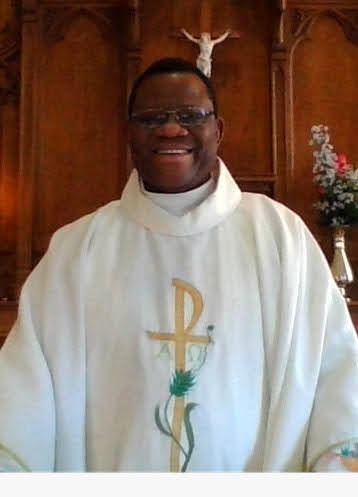READINGS FOR THE SOLEMNITY OF THE ASCENSION OF THE LORD, YEAR C, SUNDAY 1ST JUNE, 2025. (WORLD COMMUNICATION DAY).
First Reading: Acts 1:1-11
Psalm: 46
Second Reading: Ephesians 1:17-23
Gospel: Luke 24: 46-53
REFLECTION BY FR CORNELIUS NWAOGWUGWU, CM.
THE SIGNIFICANCE OF THE ASCENSION OF THE LORD
Dear Brothers and Sisters in Christ,
My reflection today focuses on the significance of the Ascension of the Lord. For the purpose of clarity, I will first explain why the Ascension of the Lord is celebrated today in this part of the world.
In many countries where the Ascension of the Lord is observed as a Holiday of Obligation, the Ascension of the Lord was celebrated on Thursday, 29 May 2025. For such countries, today celebrates the Seventh Sunday of Easter, Year C. In Ireland this year, the Feast of the Ascension of the Lord was moved to Sunday, 1st June 2025 to encourage more Christians to observe and participate in this very important feast which is rooted in the New Testament accounts of Matthew 28:16-20, Mark 16:19-20, Luke 24:50-53 and Acts 1:6-11. Like other countries that do not observe the Feast of the Ascension of the Lord as a public holiday, Ireland through the Irish Bishops obtained permission from the Vatican to move observance of the Feast of the Ascension of the Lord from the traditional Thursday to the following Sunday, the Sunday before Pentecost.
For us in this part of the world, today is the Solemnity of the Ascension of the Lord, Year C. The term “ascension” comes from the Latin word, “ascensionem” meaning “a rising.” The concept of ascension has evolved across theological, philosophical, psychological and scientific contexts. In religious traditions, ascension often symbolizes rising to a higher spiritual state, such as Christ’s ascent to heaven in Christianity. The word ascension first appeared around 1300, referring to Christ’s ascent to heaven. The term ascension continues to evolve keeping its core meaning of upward movement.
Ascension Day is the 40th day of Easter traditionally celebrated on a Thursday to mark the end of Jesus’ earthly existence as a prelude to the gift of the Spirit. The Feast of Ascension is the celebration of Jesus’ glory after his suffering and death – the glory in which we also hope to share. The Feast of the Ascension tells us that the Church must be a community in mission, guided by the Holy Spirit and confident of God’s protection even in the face of suffering and death. Jesus’ Ascension is both an ending and a beginning. The physical appearances of Jesus are at an end — the revelation of the “Good News” is complete; the promise and mission of the Messiah is fulfilled. Now begins the work of the disciples to teach what they have learned and to share what they have witnessed.
After promising the Holy Spirit as the source of heavenly power for the apostles to bear witnesses throughout the whole world, the Risen Christ, promised: “I am with you always, even to the end of time.” The ascended Jesus is with us at all times and in all places, releasing a new energy upon the earth. This is the energy of the Holy Spirit. It came down upon the Apostles. It is also given to each of us so that we may preach the Good News of salvation to all the world, while bearing witness to Jesus by living out His word.
Today is called World Communication Day. This year, marks the 59th World Day of Social Communications. A message was written and shared for this year’s celebration by Pope Francis before his death on Monday, 21 April, 2025. In his message entitled: “Share with gentleness the hope that is in your hearts” Pope Francis encourages everyone to share hope with kindness. He reminds us that true communication is not about arguments or forcing opinions but about listening and speaking with respect. Inspired by St. Peter’s words, he asks people to share their faith and hope in a gentle, loving way. (1Peter 3:15-16). Social communication should build connections, not division. In a world filled with negativity, kindness and understanding help bring people together. He invites all of us to use words and messages that inspire peace, encourage dialogue and spread positivity. By doing this, we can create a more compassionate world where hope shines through every conversation. (Message of His Holiness Pope Francis for the 59th World Day of Social Communications, 2025).
In my reflection today, inspired by the readings of our liturgical celebration, I share with you the significance of the Ascension of the Lord Jesus into heavenly glory. This indicates that the season of Easter is nearly at an end.
Today’s First Reading describes how Jesus interacted with his disciples for forty days after his Resurrection. He instructed the Apostles to remain in Jerusalem to receive the Holy Spirit, the source of power. Once they received the Spirit, they would bear witness to Jesus to the ends of the earth by their preaching and their lives: “You will be baptized with the Holy Spirit” and become “My witnesses in Jerusalem, throughout Judea and to the ends of the earth.” Then Jesus was lifted up in the sky and was covered by a cloud. The disciples received the angelic message that the ascended Jesus would come back again in glory “in the same way as you have seen Him going into Heaven.” Thus, the Ascension of Jesus means that the risen Jesus has entered into the glory of the Heavenly Father. Jesus has accomplished our salvation by suffering and death, burial and Resurrection, Ascension and the sending of the Spirit. (Acts 1:1-11).
Today’s Responsorial Psalm celebrates God’s universal kingship. It says, “God is king of all the earth.” This psalm was originally sung in connection with a cultic procession honouring the Ark of the Covenant. This most sacred religious object served as a pedestal upon which God was invisibly enthroned. During an annual feast it would be taken from repose in the Temple’s Holy of Holies and returned in solemn procession. It says, “God mounts his throne!” This cultic cry, our psalm refrain today, refers to the solemn installation of the Ark within the Temple, a liturgical reenactment of the universal lordship that is God’s from eternity. Now, by Jesus’ Ascension the risen Lord likewise “mounts his throne” in glory. (Psalm 46).
In the Second Reading, St. Paul puts special emphasis on the truth that Jesus, our triumphant Lord, now rules in glory over all creation. He prays: “May God enlighten the eyes of your hearts so that you may know the great hope to which you have been called.” (Ephesians 1:17-23).
In the Gospel according to Matthew, Jesus gives his mission to all the believers: “Go, therefore, make disciples of all the nations.” (Matthew 28:16-20).This mission is not given to a select few but to all believers. We are Christians by Baptism. To be a Christian is to be a proclaimer and an evangelizer. There is a difference between preaching and proclaiming. “We preach with words, but we proclaim with our lives.” In the descriptions of Christ after his Resurrection, we are given a hint of what life will be like in heaven. But in today’s Gospel, it is in the Ascension that we see Jesus entering fully into the life and glory of God. After the ascension of Jesus Christ, the disciples “worshipped him and then went back to Jerusalem full of joy; and they were continually in the Temple praising God.” The prospect of sharing that glory should be the driving force of our lives. (Luke 24:46-53).
Reflecting on the Feast of the Ascension within the context of today’s readings I share with you some insights I have discovered that can act as a spring board that can spun us into action towards effective Communication and Evangelization of all people and nations.
I have discovered that we are being commissioned to go forth and proclaim the Gospel of life and love, of hope and peace, by the witness of our lives. On this day of hope, encouragement and commissioning, let us renew our commitment to be true disciples everywhere we go, beginning with our families and our communities, “living in a manner worthy of the call we have received.”
Again, I have discovered that we need to live a life of Christian joy in the presence of the ascended Lord. The disciples “returned to Jerusalem with great joy.” (Luke 24:50-53). Apparently, Jesus’ exaltation and final blessing gave them, as it gives us, the assurance that, though absent, Jesus is present even in the pain and sorrow we undergo. We can discover Christ’s presence at every turn of our life’s journeys to his final return at the end of time.
I have discovered that when our faith is so weak and we are unable to pray on our own, we are called to remember that we have an advocate with the Father, Jesus Christ, the righteous, praying for us. When the trials of life feel too heavy to bear, we must remember that Christ will come again in glory, the same glory in which he arose from the tomb, the same glory in which he ascended and the same glory in which he currently abides. Though our limited perception might find Jesus absent, Jesus is fully present, participating in every moment of our lives.
I have also discovered that Jesus taught us lessons of Faith, Hope, Forgiveness, Mercy, Redemption and Love. We cannot put these lessons on a shelf and ignore them. These lessons are significant. They stand before us in the person of Jesus. Although no longer visibly present in the world, Jesus is present in His words. We must make His words real in our lives and in the lives of others. This is why Jesus promises to empower his messengers with His abiding presence and that of the Holy Spirit. The challenge of sharing the Good News with all mankind should, therefore, begin with our admission that we have often been arrogant and overbearing. We must learn to be humble and let the Holy Spirit lead the way.
By His Ascension, Christ has not deserted us but has made it possible for the Holy Spirit to enter all times and places. St. Paul exhorts us to live in a manner worthy of our calling and mission. The greatest witness we can bear to the presence of Jesus in our midst is our unity with God, seen in our living with one another in peace and harmony. (Ephesians 4:4-13).
Like St. Paul, I pray for each of us to be transformed by the power of the Holy Spirit into instruments of peace through Jesus Christ our Lord. Amen.
Fr. Cornelius Nwaogwugwu, CM.

